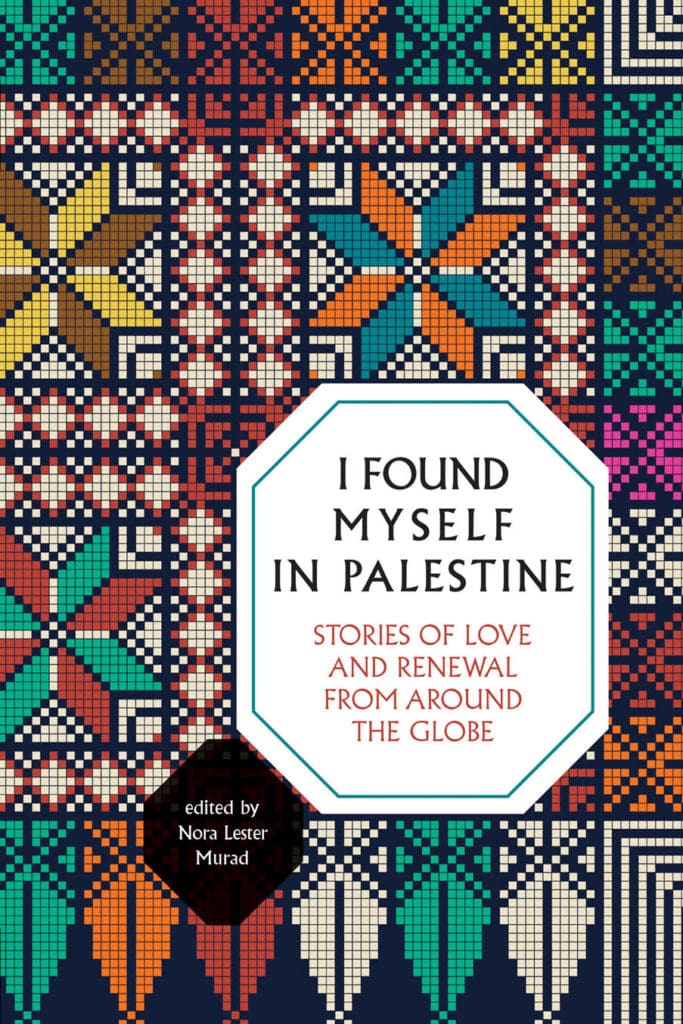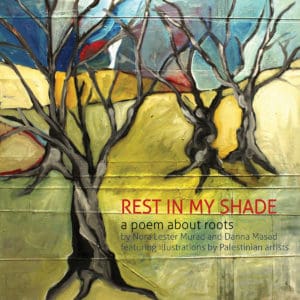This article originally appeared in Mondoweiss. It was written by Alison Glick.
The main title of Nora Lester Murad’s edited collection of personal reflections on being a foreigner in Palestine, “I Found Myself in Palestine,” is the perfect articulation of the two kinds of narratives found in the book. Pronouncing it without any particular word accentuated, almost without thinking, the phrase conjures up an image of someone arriving in this beloved and besieged land as if by accident – perhaps an unexpected side trip or a wrong turn? Yet accentuating the title’s second word alludes to another type of story – that of the foreigner who sojourns to Palestine and manages to fill an emptiness inside herself, a void she wasn’t aware existed. In a few instances, both meanings exist simultaneously. The charm and poignancy of the book lies in understanding that whatever the impetus for travel, the writers contributing these reflections are sharing profound human experiences that indelibly shaped their lives.
Murad’s introduction and a prologue and postscript by Palestinian writer Miriam Barghouti distinguish the book as more than a compilation of vignettes. The pages are filled with introspective, touching, edifying, and funny stories.
Written as if in dialogue with each other and the contributors, these pieces anchor the book’s insights and the significance of living as a “well-intentioned” foreigner in a colonized land, reminding us that foreigners also shape the lives of Palestinians and the lived reality of Palestine in ways that can be inspiring but also deeply problematic.
As a U.S. citizen and solidarity activist, Murad ponders the role ajanab (foreigners) like her have in cleaning up the mess we made, given our government’s support for the ongoing occupation and colonization of Palestinian land. Following Murad’s introduction, Barghouti’s prologue further contextualizes the attraction Palestine has to many kinds of foreigners and the effect of their presence. She describes the impact of Zionist colonizers, foreign governments, and certain kinds of NGOs that undermine grassroots resistance and strip away Palestinian agency “in layers.” This is an apt metaphor for how Israel enacts control over Palestinian land and lives. This includes internationals who are often “unable to recognize the complexities of displacement and the privileges afforded to them in Palestine simply for being foreign,” Barghouti writes. Contemplating, as a Palestinian, the arrival of strangers, even those “with a thirst for justice, brave enough to harness introspection and to confront the unjust power around us,” she details, in achingly beautiful prose, the “never-ending estrangement from our homeland… Absence permeates the Palestinian experience. Absence of justice, absence of loved ones, absence of choice and quality of life, absence of the right to belong.” What does it mean for Palestinians to welcome (or not) foreigners when, “In a strange twist of events, we too become ajanab”?
The twenty-one narratives in the book are an attempt to answer that question.
There can be and is a great deal of difference among ajanab who find themselves in Palestine. Several contributors are in Palestine as trailing wives, having met their Palestinian husbands while they were studying abroad. Some of their stories focus on being warmly welcomed into families, sometimes by in-laws who were initially skeptical of their unions and radiate an emotional warmth and tenderness not viewed as the norm in Western cultures. Pondering the difference between the multitude of kinship terms used in Palestine (and elsewhere in the Arab world) and the cold “legal and un-familial” term “in-laws” used in America, Helene Furani observes, “Perhaps in American society, the legal relationship is what matters, whereas in Palestine what clearly matters most is the collective-personal-social sense of belonging and connectedness.”
A sentiment expressed in other essays, Furani shares what she has learned about finding herself in Palestine after 14 years: “I did not truly fathom what I was getting myself into when I married Khaled, but I did know what I was leaving behind…. isolated American suburbia, with its plasticized conviviality, life of ease, and constant social flux, compounded with family few and far away…”
Two bittersweet stories written by North American men who traveled to Palestine to work tell of marrying Palestinian women, both of whom tragically die of cancer, leaving them widowers with children to raise. One, Steve Sosebee, decides to fulfill his wife’s wish and raise their daughters in Palestine, while growing the work of the organization they founded, the Palestine Children’s Relief Fund (PCRF). After establishing a pediatric cancer center named for his late wife, Huda Al Masri, he eventually remarries a Sudanese-American pediatric oncologist who joins him to work at a PCRF cancer center in the Gaza Strip.
Dr. Zeena Salman’s story is an honest, sensitive account of the racism and colorism she faces as a Black woman in Palestinian society, where even her perfect Arabic couldn’t convince a shopkeeper that she is Arab. He repeatedly tells her, “We don’t have Arabs that look like you.” She is stung by casual comments during everyday interactions, like that of the hairdresser who tells her it’s good her infant daughter “isn’t too dark.” What ultimately grounds Salman and her husband in their adopted home is the commitment they’ve made to serve the people of Palestine. For foreigners who acknowledge and navigate both the problematic aspects of Palestinian society and the privilege that gives them access denied to many Palestinians, the label ajanab is peeled away – at least temporarily — to reveal something more profound. In the words of Salman:
But when I am working at the cancer department, these differences don’t exist. There are children, innocent but strong, some days playing in the playroom with an IV in their arm, other days weak in bed from their treatment…There are mothers and grandmothers at their bedsides, tired, yet patient and kind. They look at me and they see not an ajnabiya. They see a caregiver, a woman, a fellow mother who feels their pain…We talk, I explain, they unload. Sometimes there are tears, sometimes on both sides. There is a kind of symbiosis between us. I know why I am here.”
The symbiosis she acknowledges speaks to a truth non-Palestinians who find themselves in Palestine must recognize on some level: the experience of living in Palestine gave them as much — or more — as they gave to Palestinians.
Underlying the stories are, of course, the Israeli occupation of the West Bank and Gaza, and the systemic racism and discrimination against Palestinian citizens that areembedded in Israeli society. As one German NGO worker states, “In the midst of great beauty, the scars of occupation are always visible.” The writers in this collection identify and respond to this scarring in ways as varied and interesting as their stories. There is the contribution of Fatima Gabru, an Indian woman whose family shielded her from racial politics in apartheid South Africa while growing up there but, once confronted with the reality of Israeli apartheid as an adult, she is compelled to take a stand with Palestine. And there are stories by journalists, aid workers, and human rights defenders who find deeper connection to and meaning in their work and themselves while living in Palestine. For some, this takes the form of finding faith and a spiritual relationship to the world that takes them by surprise. For others, living and working among Palestinians emboldened them to break away from their professions’ zeitgeist and challenge prevailing Orientalist and colonial mindsets, at a cost to their careers.
Some reflections are told with humor and levity, the best of these doing so while speaking volumes about interpersonal relationships, inter-cultural differences, and the ignorance of Orientalist stereotypes. One such contributor is Samira Safadi, a German-Palestinian woman who leaves East Berlin after that wall fell and eventually arrives in Ramallah where she meets her future husband. Her contribution, written as a play script of short vignettes from her personal and work life, is a wry, sidelong glance at identity, and a charming account of realizing what a gift embracing a new culture truly is. Here is Safadi’s account of her wedding day:
ME: But I thought we agreed to invite only around seventy people?
FUTURE HUSBAND: Actually, there might be around 200 guests. I printed 700 invitation cards.
ME: You did what?
FUTURE HUSBAND: It was the same price.
ME: But who did you invite?
FUTURE HUSBAND: All my friends and the family of friends. They are a lot, you know.
ME: Why didn’t you tell me?
FUTURE HUSBAND: Because I wasn’t sure if you would agree, and I was worried you might cancel the wedding.
ME: Oh.
FUTURE HUSBAND: You’ve never been to an Arabic wedding. You’ll see. You can’t just invite seventy people. But don’t worry. I have everything under control.
Safadi also tells about hosting fifteen German Parliamentarians at her home as follows:
PARLIAMENTARIAN: Do you wear the same clothes when you walk in Ramallah in the streets as you wear here in your home? Don’t you wear a headscarf?
ME: Um, no, I don’t wear a scarf. And I go out in public in normal clothes.
PARLIAMENTARIAN: How did your marriage to a Muslim Palestinian affect your situation as a woman?
ME: Everything is fine! My husband is Muslim culturally. Actually, he’s a communist. In the household, he takes care of most of the work, since I have long working hours. We’re not religious. But we celebrate Christian holidays, as well as Muslim ones.
She recounts an incident in her garden on Easter:
ME: Honey, I feel so ill. Could you decorate and set everything up? The children are so excited and want to hunt for eggs.
HUSBAND: Just let me be sure I understand how you do it. I hide the boiled eggs behind plants and flowers and trees?
ME: Yes, exactly.
HUSBAND: And I hide the chocolate bunnies and other sweets in the garden?
ME: Yes, sweetie.
HUSBAND: It’s a strange tradition, isn’t it?
ME: I’ve never thought about it. But yes, it’s a strange tradition somehow. Now, can you please put the eggs under the trees?
Murad’s decision to include an essay from a Palestinian from the diaspora is an interesting one that is explored in the prologue.
The last piece in the book is by Nadia Hasan, a Chilean-born Palestinian whose emotional and sometimes harrowing journey to understand fully her Palestinian identity culminates with setting down roots in Ramallah, where she is raising a daughter. Hers is the story of countless Palestinians, whose dispossession and exile create and recreate generational trauma. But hers is also the story, ultimately, of triumph. She regenerates the loss of kinship imposed by the Nakbathrough her daughter and their presence on the land — a presence facilitated, ironically, by her ability to enter as a “foreigner” working for an international aid organization. Her triumph, to be sure, leaves her with wounds inflicted by other Palestinians as well as by Israeli policy. But in time she is able to let those scars go because she has found herself in Palestine.
Barghouti’s postscript centers the “collision of worlds” that occurs between the divided and disconnected places of Palestinian existence and the worlds of the ajanib. This should not be mistaken with the nefarious “clash of civilizations” theory used to justify a new imperialist order. Rather, this colliding is not only inevitable but necessary and, ultimately, productive. She writes, “…it is upon impact that both appreciation and resentment are forged,” positing a view of such interactions that is not only more humane but reflective of history’s progress.
“The voices gathered on these pages provide hope that in the spaces where we share, communicate, support, and uplift to keep going on, our stories become a lattice for a different vision of the world,” Barghouti writes.
May it be so.


